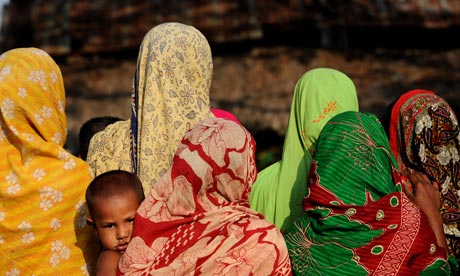The World Bank's agriculture investments provide one such example. Although the bank acknowledges that gender equality is critical to achieving the millennium development goal to end extreme hunger, this admission is hardly reflected in actual agriculture investments.
While the bank's annual budget has more than doubled in the past five years to $58.8bn, the share of its budget devoted to the agriculture sector has decreased by 2% to 3%. In 2010, the bank spent only $2.6bn – or 4% of its FY2010 budget – on the agriculture sector. Bank investments in financial and private sector development, meanwhile, more than quadrupled from $4.2bn to $17.7bn in the past five years.
It's therefore no surprise that the Democratic Republic of the Congo, one of the most food insecure countries in the world, currently receives $630m for finance, industry and trade sector projects, and less than a third of this amount for agriculture. The bank's declining support for rural agriculture disproportionately harms poor women, who constitute the majority of small-scale farmers and play a critical role in growing, processing and preparing food.
Most World Bank agriculture investments also fail to adequately address gender inequalities, such as women's lower education levels, discriminatory barriers to land ownership, credit, agricultural inputs like seeds and fertilisers, as well as women's lack of decision-making and leadership roles, and unequal domestic and childcare responsibilities.
The large private sector "agro-industry" investments particularly undermine women's participation and economic empowerment that the World Bank repeatedly promises, while overwhelmingly benefiting corporations. Although some agriculture investments acknowledge the link between unequal gender roles and food insecurity, they rarely fully address this issue. This is most apparent in the decades-long failure to routinely collect sex-disaggregated data to measure their investments' real-life impact on women and girls, despite persistent World Bank research recommending doing so.
In the absence of investments that promote gender equality and enhance women's agricultural productivity and income, women must find ways to cope with increased food insecurity and the catastrophic rise in food prices. A woman facing chronic food insecurity may have to buy cheaper, less nutritious foods, eat less to allow more food for her children, or skip meals entirely. If she becomes pregnant, the lack of sufficient calories and micronutrients will take a great physical toll not only on her, but on the future health of her child: Zambian women who got pregnant during a period of high corn prices in 2001-02 experienced severe micronutrient deficiencies, which led to increased stunting among their children.
Women in Bangladesh report that the more they pay for food, the less they spend on other basic needs, including education and healthcare. Under these circumstances, girls' school attendance is likely to suffer the most, as girls may have no choice but to spend time foraging for food or begging on the street.
The World Bank's gender-blind agriculture investments are even more appalling when they are offered in the form of loans, which increase poor countries' debt burden and often compel governments to slash public spending on health and other social services to service debt. These cuts are devastating for poor women, who not only suffer directly from lack of access to healthcare, but are responsible for the health and welfare of their households.
Poor countries can appeal to the World Bank for debt relief, but only if they demonstrate a track record of adopting bank-imposed "free-market" policy reforms, including privatisation of state-owned enterprises and unilateral reduction of agricultural trade barriers while rich countries maintain theirs. Women inevitably bear the greatest burden when such policy reforms undermine poor countries' investments in agriculture, health and education.
The World Bank must "act equal" and turn its gender equality rhetoric into action. If it is truly committed to ending hunger, it will promote women's rights in all agriculture investments. It will offer grants – not loans – and ensure that each agriculture project improves the livelihoods of poor women and men, boys and girls. It will drop demands that poor countries adhere to destructive, gender-blind policy agendas that undermine rural agriculture, health and education.

needs, including education and healthcare. Photograph: Munir Uz Zaman/AFP/Getty Images
